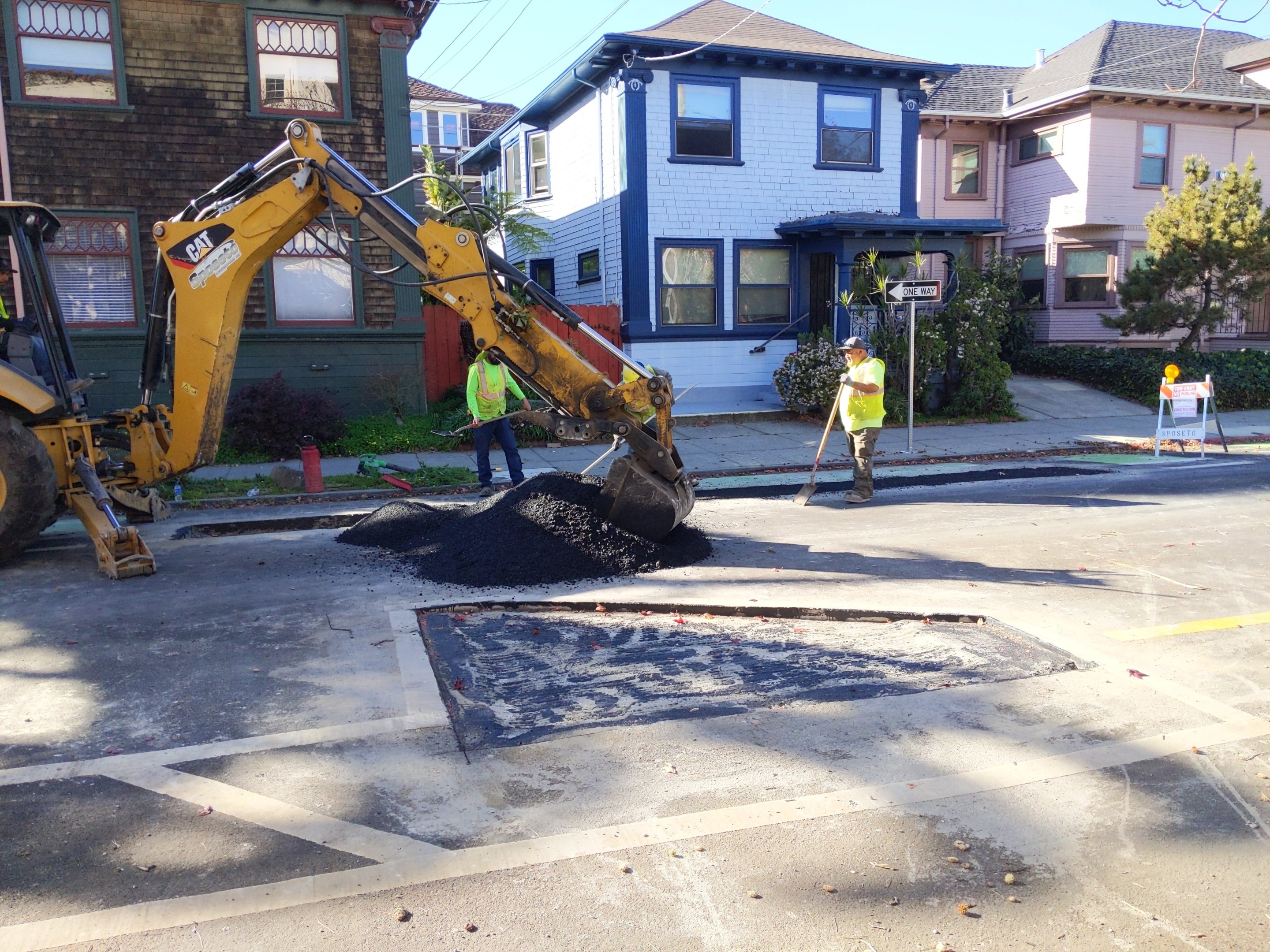Note: GJEL Accident Attorneys regularly sponsors coverage on Streetsblog San Francisco and Streetsblog California. Unless noted in the story, GJEL Accident Attorneys is not consulted for the content or editorial direction of the sponsored content.
Workers with the City of Berkeley destroyed a substantial portion of a block of newly installed protected bike lane and a concrete island on Milvia, between Dwight and Haste earlier this week. The move surprised and infuriated advocates:
WE ARE PISSED!
— Walk Bike Berkeley (@WalkBikeBerk) February 3, 2022
The Milvia Bikeway Project isn’t even finished and the City has ripped out a brand new protected bike lane concrete curb and island between Dwight and Haste.
Why, @CityofBerkeley?!?! 🧵 https://t.co/ckLtmKAXoW pic.twitter.com/FtvaI14AbR
Farid Javandel, Berkeley's transportation manager, told Streetsblog he was disappointed by the move, but that it had to be done because the Alta Bates medical center was unable to get large oxygen trucks in to refill the center's tanks, despite the driveway on Haste, the nearest cross street. "They can't go in and back out the same way," he said.
He sent the following diagram, showing the areas that interfered with truck access to the facility from Milvia:

Although it's not indicated, near the upper left on the above diagram is a large oxygen tank at the edge of the parking lot. And this is the view from Haste of the same parking lot and loading docks. From this perspective, the oxygen tank is just off frame to the right:
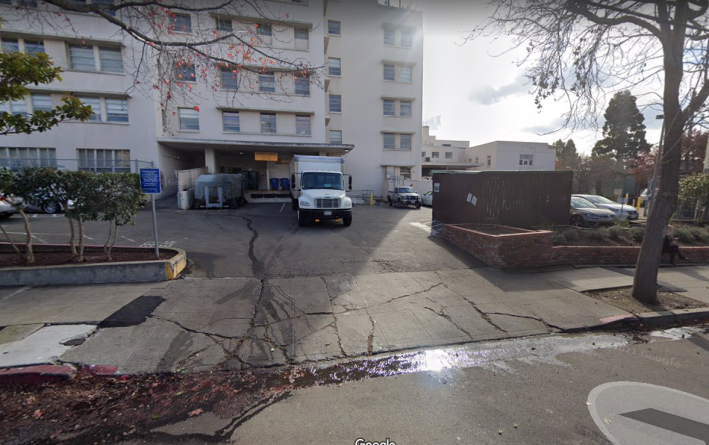
"I am dismayed that the Hearst to Dwight protected bikeway was removed," wrote Kate Harrison, Berkeley Vice Mayor and the councilperson who represents the district. "We should be discussing alternatives such as curbs that are mountable by Alta Bates and City emergency vehicles instead of erasing years of planning."
As Streetsblog has covered before, mountable curbs are a commonplace solution to allowing fire trucks and other large vehicles to access tight spots while maintaining protection for cyclists.
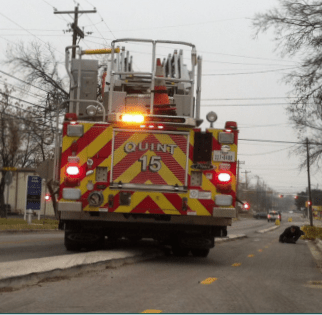
Javandel said the city "can replace the concrete and the island with a mountable island or retractable bollards." In fact, he hopes to get new curbs or bollards installed before the planned opening ceremony in March. However, "they needed to get this fixed quickly" so the hospital could refill their tank and start getting oxygen again.
"We are identifying quickest way to purchase and install," tweeted Mayor Jesse Arreguin.
Of course, nobody wants the hospitals' patients to be deprived of oxygen. However, in Streetsblog's view, this highlights another thorny issue: why do cities allow such enormous trucks in the first place? A smaller, more nimble truck wouldn't have this problem. Moreover, there are already parts of that parking lot that are crosshatched out to maintain truck access, as seen below:
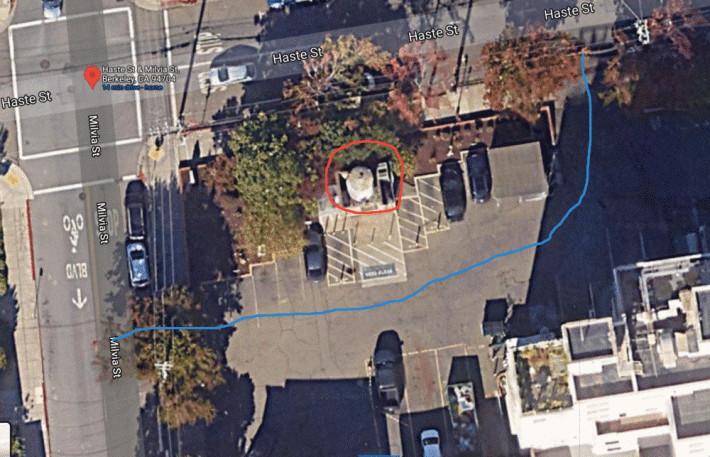
It seems hard to believe there's simply no way space could be provided to turn a truck around or at least back it in via the driveway on Haste. Does the inability to maneuver a truck into the parking lot have something to do with the physician-reserved parking spots that are next to the oxygen tank? Streetsblog has reached out to the medical facility and will update this post.
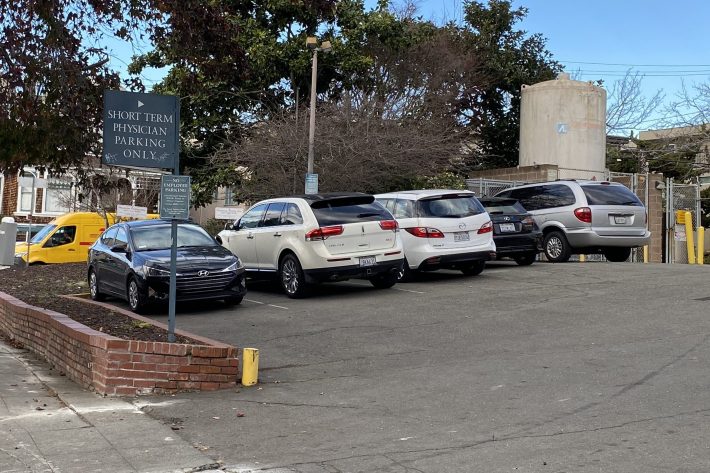
Regardless, Campbell said he remains "super pissed off this happened with nobody talking to anyone on this project. We're tasked with years of planning outreach and engagement to make sure projects address concerns, but we can rip them out with no conversation whatsoever?"
"This project was the #1 priority in the 2017 bike plan. More people bike on Milvia than any bikeway in the City. And it has the most collisions," wrote the advocates at Walk Bike Berkeley, on social media. "There was extensive public outreach. It was just resurfaced."
Streetsblog readers will recall in October Berkeley finished substantial portions of the Milvia Bikeway Project, which included concrete-protected bike lanes and a loading islands. A celebration and ribbon cutting was planned for March 1.
"Berkeley is planning to celebrate this project," said Campbell. "If they don't fix this we'll be there to protest."
